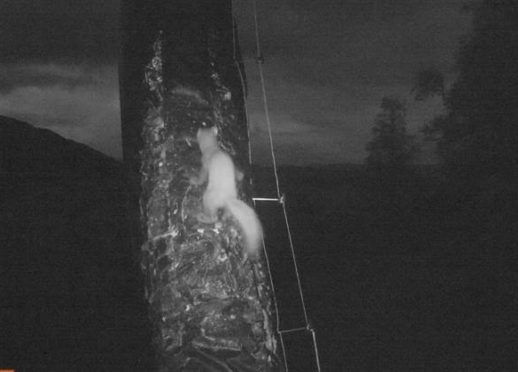Osprey chicks in a West Highland forest have given a predatory pine marten the slip – thanks to a greased-up tree trunk.
The pair of tiny raptors – which have become global internet stars – survived two attempts by the pesky predator because their nest was pine marten-proofed.
The chicks at Woodland Trust Scotland’s Loch Arkaig Pine Forest in Lochaber were yesterday officially named after a public vote, being called Mallie – as the nest is located in Glen Mallie – and Rannoch, the Gaelic word for Bracken to honour Woodland Trust volunteer Liz Bracken who watches the nest from across the loch.
In 2017, novice parents Louis and Aila successfully raised their first chick, Lachlan.
But they were not so lucky last year when all three eggs were stolen by a pine marten.
The tree was greased-up by workers in a bid to prevent a repeat, and the trust’s George Anderson said: “A marten attempted two more egg raids this year but was repelled by the first line of defence.
“The tree was greased and the pine marten slid right off. It was like something out of a coyote and roadrunner cartoon – Highland-style.”
Other marten-proofing measures on the tree include electrified wire to give any raider a mild jolt and the removal of all low hanging branches so martens have no jump-on points.
Martens have also been known to tunnel through the bottom of nests to remove eggs from under a sitting osprey – so the nest platform has a layer of chicken wire running through it to stop them.
The public has been able to watch activity through a live internet camera stream. Additionally, in order to monitor how the marten-proofing was working, a trail camera was left at the foot of the tree.
This motion-triggered camera captured shots of all visitors and contained shots of the would-be burglar.
Mr Anderson added: “Our osprey audience around the world has been fearful of another marten raid, so it is good to see that the defences have been effective.”
Ospreys and pine martens share a history of human persecution.
Ospreys were shot for taxidermy, or as a threat to game. Collectors took their eggs. They became extinct in the UK in 1916. The last pair nested on an island in Loch Akraig.
The comeback began in 1954 when a pair settled to breed at Loch Garten in the Cairngorms. Now there are around 300 pairs around Britain.
The pine marten was one of the most common carnivores in Britain. Now it is one of the rarest. Loss of habitat, the fur industry and predator control associated with game shooting caused a dramatic decline in the population.
